Is Egypt heading for holy war?
- Published
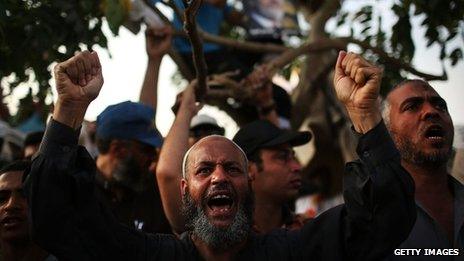
The removal of President Morsi sent a very dangerous message to Islamists
Even posing that question will annoy many.
Away from the troublespots, life for millions of Egyptians continues as normal. Egypt's most fundamental problems are more economic than political.
But in a week when the political arm of the Muslim Brotherhood called for "an uprising by the great people of Egypt against those trying to steal their revolution with tanks", when dozens were killed in clashes between the army and Islamists and when the grand sheikh of al-Azhar warned of a civil war, an awkward question hovers in the air.
Is Egypt now prone to a new "holy war" fought by Islamists against the authorities?
Extremist minority
There are plenty of grounds for optimism that the Arab world's most populous country should be able to avoid a descent into wide-scale, fanatical, religiously-inspired violence following the ousting of President Mohammed Morsi last year.
Having lived there twice, for several years, I have experienced first-hand how good-natured, generous and mostly tolerant Egyptians can be.
There are extremists in their midst but they are in a minority. Their views, however noisily they are broadcast, do not represent the bulk of the population.
Egypt has also survived worse crises within living memory: the assassination of its president by a jihadist cell in 1981 and an Islamist insurgency that killed more than 700 people in the late 1990s, culminating in the massacre of 58 foreign tourists at Luxor in 1997.
But given the unhappy confluence of events and trends surfacing in Egypt this week, it would be unwise to ignore the seeds of a potential holy war now being sown.
Let's look at the ingredients:
'Martyrdom', banners and rhetoric
"We will carry out explosions, we will shoulder arms, and nothing other than death will dissuade us from restoring President Morsi to the palace," the newspaper, al-Hayat, quoted a bearded man proclaiming at one of the sit-ins by Muslim Brotherhood supporters.
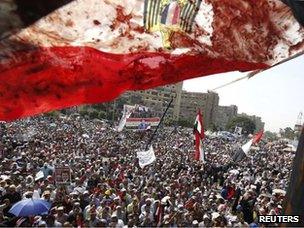
A blood-stained Egyptian flag was flown at a Muslim Brotherhood protest in Cairo
Small numbers of young men are starting to be seen in the crowd wearing the white shrouds of "martyrdom", a theatrical show of how far some say they are prepared to go to return an elected Islamist president to power.
Since Mr Morsi's removal, some internet forums have erupted with angry calls for vengeance against Egypt's military, calling it "the enemy of Islam" and declaring police and soldiers to be targets for attack, as they were in southern Egypt during the insurgency of the 1990s.
For now, these statements are mostly rhetorical and aspirational - although security forces have often been attacked in the Sinai.
The threat to mainland Egypt only becomes real when such rhetoric inspires people to translate it into violent action.
Available weapons
Security in Egypt has deteriorated dramatically since the overthrow of the dictatorial President Hosni Mubarak in 2011, but compared with Syria, Libya, Iraq and Yemen there are still relatively few firearms in private hands.
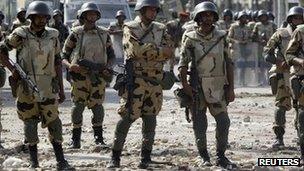
The Muslim Brotherhood is demanding the military reinstate Mr Morsi as president
Yet mainland Egypt is sandwiched between two land masses awash with illegal weapons: Libya and the Sinai peninsula.
The overthrow of Col Muammar Gaddafi's regime next-door in Libya threw open the doors to his armouries, releasing a flood of firearms, many of which have ended up with jihadist groups operating across the Sahara and in eastern Libya.
A UN report published in April concluded that "weapons used during the Libyan civil war against Muammar Gaddafi are being funnelled at an alarming rate to other countries in the region".
It said the weapons ranged from small arms to high-powered explosives, mines and portable air-defence systems.
The report said this flow of weapons into Egypt was a threat to its internal security because many were reaching anti-government insurgents in Sinai.
Religious clashes
Nearly 10% of Egypt's population are Coptic Christians.
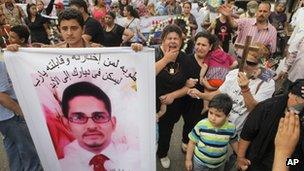
There were clashes between Christians and Muslims in Egypt during Mr Morsi's rule
Mostly, they live harmoniously in this Muslim-majority country but some Islamist extremists want to see them driven out, as much of Iraq's Christian population has been.
There have been isolated but deadly attacks on Egypt's churches and Christians, and for the past year during Mr Morsi's presidency, many Egyptian Copts doubted his government's commitment to protect their community properly.
Now that he has been ousted, there is a counter-suspicion by some Muslim Brotherhood supporters that Christians somehow had a hand in his removal.
If Egypt were to fall prey to jihadist violence, then its Coptic Christians would find themselves easy targets.
Political frustration
There is an almost unanimous view amongst analysts of the Middle East that, however incompetent the rule of President Morsi was, his forced removal after just one year in office sends a very dangerous message to Islamists.
It risks leaving them with the conclusion that the democratic process the West has touted for so long is an avenue closed to them, prompting some to turn to the bullet instead of the ballot.
Writing in al-Quds al-Arabi, the editor Abdel Bari Atwan said: "The military coup will certainly lead to serving extremist groups within the Islamic current, specifically within the Muslim Brotherhood, and will confirm the argument of al-Qaeda and other groups, which reject democracy and consider it a Western invention."
Failing economy
Lastly, but no less importantly, Egypt is facing a slow-motion economic crisis.
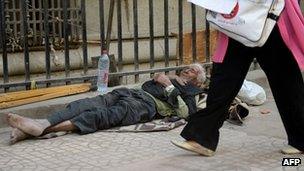
Egypt's battered economy remains in crisis
Since the 2011 uprising against Mr Mubarak, the country's latent economic and fiscal problems have gone into free fall.
Tourism has slumped, unemployment and crime has soared, confidence has evaporated and the government is running out of money.
Mr Morsi's inability to fix these problems was a major contributor to his unpopularity but those problems will still be there for whoever becomes his elected successor.
A combination of a failing economy, zero job prospects and profound political frustration can lead to a dangerous sense of despair. Fertile ground, then, for those looking to recruit for nefarious purposes.
You can follow Frank on Twitter @FrankRGardner
Mardell: When is a coup not a coup?